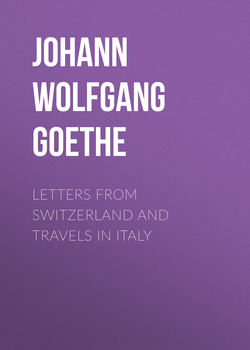Читать книгу Letters from Switzerland and Travels in Italy - Johann Wolfgang von Goethe - Страница 4
LETTERS FROM SWITZERLAND
PART THE FIRST
Conventional education
ОглавлениеThere is something pretty and instructive about the symbols and maxims which one here sees on all the stoves. Here you have the drawing of one of these symbols which particularly caught my fancy. A horse tethered by his hind foot to a stake is grazing round it as far as his tether will permit; beneath is written, "Allow me to take my allotted portion of food." This, too, will be the case with me, when I come home, and, like the horse in the mill, shall have to work away at your pleasure, and in return, like the horse here on the stove, shall receive a nicely-measured dole for my support. Yes, I am coming back, and what awaits me was certainly well worth all the trouble of climbing up these mountain heights, of wandering through these valleys, and seeing this blue sky – of discovering that there is a nature which exists by an eternal voiceless necessity, which has no wants, no feelings, and is divine, whilst we, whether in the country or in the towns, have alike to toil hard to gain a miserable subsistence, and at the same time struggle to subject everything to our lawless caprice, and call it liberty!
Aye, I have ascended the Furca– the summit of S. Gotthard. These sublime, incomparable scenes of nature, will ever stand before my eye. Aye, I have read the Roman history, in order to gain from the comparison a distinct and vivid feeling what a thoroughly miserable being I am.
Never has it been so clear to me as during these last few days, that I too could be happy on moderate means – could be quite as happy as any one else, if only I knew a trade – an exciting one, indeed, but yet one which had no consequences for the morrow, which required nothing but industry and attention at the time, without calling for either foresight or retrospection. Every mechanic seems to me the happiest of mortals: all that he has to do is already settled for him, what he can do is fixed and known. He has not to rack his brains over the task that is set him; he works away without thinking, without exertion or haste, but still with diligence and pleasure in his work, like a bird building its nest, or a bee constructing its cells. He is but a degree above the beasts, and yet he is a perfect man. How do I envy the potter at his wheel, or the joiner behind his bench!
Tilling the soil is not to my liking – this first and most necessary of man's occupations is disagreeable to me. In it man does but ape nature, who scatters her seeds everywhere, whereas man would choose that a particular field should produce none but one particular fruit. But things do not go on exactly so – the weeds spring up luxuriantly – the cold and wet injures the crop, or the hail cuts it off entirely. The poor husbandman anxiously waits throughout the year to see how the cards will decide the game with the clouds, and determine whether he shall win or lose his stakes. Such a doubtful ambiguous condition may be right suitable to man, in his present ignorance, while he knows not whence he came, nor whither he is going. It may then be tolerable to man to resign all his labours to chance; and thus the parson, at any rate, has an opportunity, when things look thoroughly bad, to remind him of Providence, and to connect the sins of his flock with the incidents of nature.
